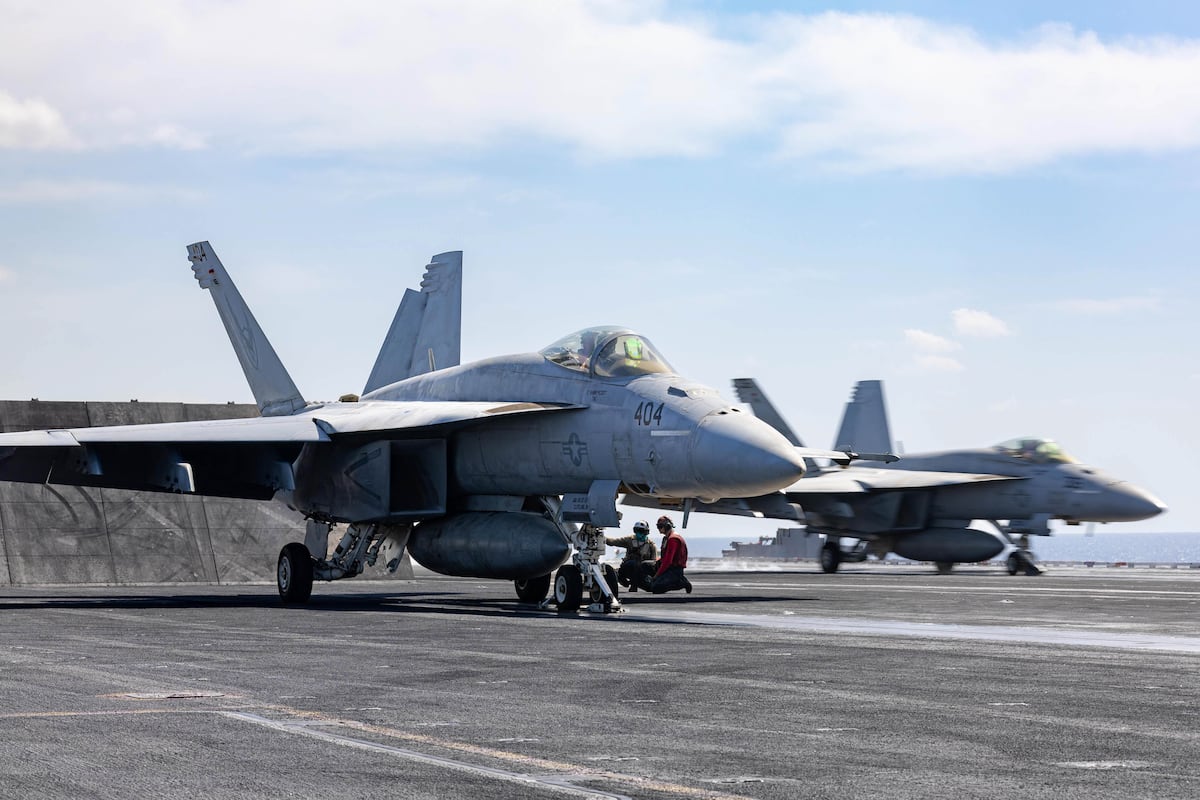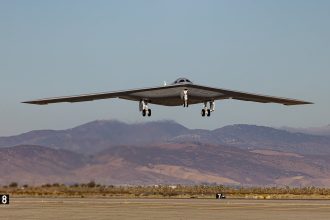Former U.S. defense officials said the details Defense Secretary Pete Hegseth texted on a non-government group chat ahead of U.S. airstrikes in Yemen earlier this month represent a serious breach of department policies and could have placed American troops at higher risk.
But White House officials insist that senior leaders did nothing wrong and blasted critics for alleged exaggerations and fear-mongering instead of celebrating a successful military campaign against Houthi terrorists.
On Wednesday, The Atlantic released transcripts and screenshots of a conversation held among top national security officials ahead of the bombing of Houthi targets on March 16.
The exchange — which involved Hegseth, National Security Adviser Mike Waltz, Vice President JD Vance and others — included details of when the surprise attacks would occur, even before some of the aircraft involved took off.
In the chat, Hegseth included time stamps for when F-18 aircraft would launch and arrive at targets and when Tomahawk missiles would be fired at buildings controlled by Houthi members.
RELATED
Administration officials inadvertently included Atlantic Editor-in-Chief Jeffrey Goldberg in the unclassified chat, which was conducted over the messaging app Signal. That program is authorized for some confidential government use but has been deemed unsuitable for sensitive or classified information under Defense Department rules.
Following the release of the messages, Senate Armed Services Committee Chairman Roger Wicker, R-Miss., said his panel is planning an investigation into the issue, with a briefing from top defense officials on the information discussed and protocols ignored.
“The information as published recently appears to me to be of such a sensitive nature that based on my knowledge, I would have wanted it classified,” Wicker said.
House Armed Services Committee member Don Bacon, R-Neb., was more critical.
“The White House is in denial that this was not classified or sensitive data,” he said Wednesday.
More than 20 Democratic lawmakers — including House Minority Leader Hakeem Jeffries, D-N.Y. — have already called for Hegseth’s resignation over the scandal.
White House pushback
Since the existence of the group chat was first confirmed Monday, White House and Pentagon officials have worked to downplay its importance and that of the details discussed in it.
Trump said Tuesday that no “classified” information was included in the chat. Intelligence officials included in the group later testified before Congress that none of the material included was classified, a claim repeated by Trump and his spokesperson, Karoline Leavitt, multiple times.
But former Pentagon officials with experience planning such attacks argued that claim is almost surely false.
“This information was clearly taken from the real time order of battle sequence of an ongoing operation. It is highly classified and protected,” said Mick Mulroy, a former Marine who was the Pentagon’s top official for Middle East policy during the first Trump administration.
Speaking with reporters Monday while traveling to Hawaii, Hegseth argued the group chat contained no “war plans,” as The Atlantic story initially alleged. Leavitt defended Hegseth’s claim Wednesday by arguing the information was instead part of an “attack plan,” language The Atlantic later adjusted in its own reporting.
Still, former defense officials familiar with the distinction said it held little relevance, or perhaps made the leak worse. Unlike a war plan, which outlines the broad overview of a U.S. military campaign, an attack plan describes an imminent operation, which could immediately put American lives at risk.
“Attack plans are actually far more sensitive,” said a former U.S. defense official with experience planning such operations, who spoke anonymously to avoid the threat of retaliation.
Another former defense official called the information “obviously classified” and said it could have jeopardized the operation.
Dangerous details
Experts interviewed for this story insisted that if the Houthis had access to the information shared in the group chat, they could’ve protected the targets in question, putting expensive American military assets to waste.
Tomahawk cruise missiles, which were used in the attack, travel at relatively slow speeds and are hard to redirect, making it more important to hit targets by surprise.
Even worse, the official warned, the Houthis could’ve fired back.
Specifying that the planes being used were F-18s, as Hegseth did, was especially risky, the two former officials said. The fighters launch from aircraft carriers, which makes it far easier to know where they’re coming from and how to target them — as the Houthis have scores of times over the last year.
“If there is a strike package coming your way, and you have an idea about where they might be going … maybe enough information that makes it easier for the enemy to shoot down an airplane, that helps them tremendously,” said Sen. Mark Kelly, D-Ariz., a former Navy pilot.
“In the first Gulf War, on my first combat mission, I almost got shot down when a missile blew up next to my airplane. I can guarantee you, if [the enemy] knew exactly where we were coming from and going to, it would have made it much easier for them.”
In a briefing from the White House on Wednesday, Leavitt said Trump had personally reviewed the transcript of the group chat and remained confident that information was handled properly. She did not directly answer questions on how the timing of a military strike would not be classified information.
The leak of internal conversations among administration officials could also benefit enemy spies, one former defense official said.
“The whole exchange starts to give other countries a sense of how this team deliberates and thinks about its allies, its tradeoffs, and generally those kinds of conversations are not public,” the official said.
Those internal conversations “are useful not just to the Houthis, but to other countries in the world who are seeking to understand America’s national security decision making, and that should be a concern.”
Amid the controversy, U.S. military operations in Yemen have continued, Leavitt said. Defense Department officials said American assets have now hit 100 Houthi targets and will continue to attack more until the group stops targeting commercial ships.
The goals are similar to those of former President Joe Biden’s administration, which launched multiple rounds of airstrikes against the Houthis for the same purpose last year.
Noah Robertson is the Pentagon reporter at Defense News. He previously covered national security for the Christian Science Monitor. He holds a bachelor’s degree in English and government from the College of William & Mary in his hometown of Williamsburg, Virginia.
Stephen Losey is the air warfare reporter for Defense News. He previously covered leadership and personnel issues at Air Force Times, and the Pentagon, special operations and air warfare at Military.com. He has traveled to the Middle East to cover U.S. Air Force operations.
Leo covers Congress, Veterans Affairs and the White House for Military Times. He has covered Washington, D.C. since 2004, focusing on military personnel and veterans policies. His work has earned numerous honors, including a 2009 Polk award, a 2010 National Headliner Award, the IAVA Leadership in Journalism award and the VFW News Media award.
Read the full article here








